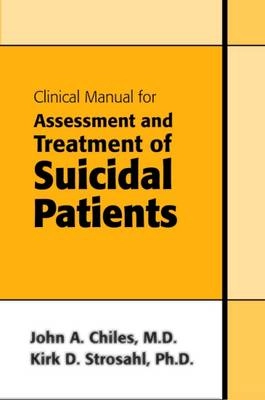The cornerstone of any intervention approach with suicidal patients is the recognition and treatment of psychiatric disorders. For many patients, however, treating the mental illness is not enough -- that is, suicidal behavior is not necessarily reduced by treatments that target those illnesses. Something more is needed. In this provocative and insightful work, Drs. Chiles and Strosahl offer a concrete, practical framework to fill this gap. In doing so, they challenge one of the chief underlying assumptions of traditional approaches to suicide assessment and treatment -- that suicidal behavior can be predicted and controlled. In its place, they propose a new conceptualization of suicidality -- as learned, reinforced problem-solving behaviors that an individual uses when all other options seem to have failed. Rather than focusing on risk prediction and management, interventions in this learning model target the problems that the suicidal behavior is being used to solve. The assumption is that a patient's suicidal behavior represents his or her best attempt at that moment in time to deal with life's difficulties. The clinician's initial task is therefore not to judge or criticize but rather to acknowledge the struggle and pain the patient is experiencing and to help the patient begin to explore other ways of dealing with the overwhelming troubles. Efforts to reduce suicidal risk are accomplished by techniques that maximize individual autonomy and encourage positive behaviors -- the person's unique resources for addressing and modifying the suicidal behavior. Designed to be used both for personal instruction and as a training manual, this comprehensive guide * Presents an evidence-based model for understanding and treating suicidal behavior in all its forms. * Features self-evaluation exercises to help clinicians develop an enhanced awareness of their own emotional reactions, moral/religious responses, and personal values about suicidality. * Provides interactive checklists and patient assessment tools designed for easy use by the typical clinician in daily practice. * Includes case vignettes and narratives highlighting key assessment and intervention principles. In Clinical Manual for the Assessment and Treatment of Suicidal Patients, the authors -- a psychiatrist and clinical psychologist -- have combined their diverse training and disciplinary backgrounds to create a workable approach to dealing with suicidal patients. Much more than merely an academic text on suicide, this thought-provoking handbook provides detailed guidance and a true sense of what to do to help suicidal patients. Practitioners in all domains of health care -- clinicians, residents, therapists, and graduate students in psychiatry, psychology, social work, and nursing -- will benefit from this valuable and accessible work. (Bookdata)
Åtkomstkoder och digitalt tilläggsmaterial garanteras inte med begagnade böcker





















